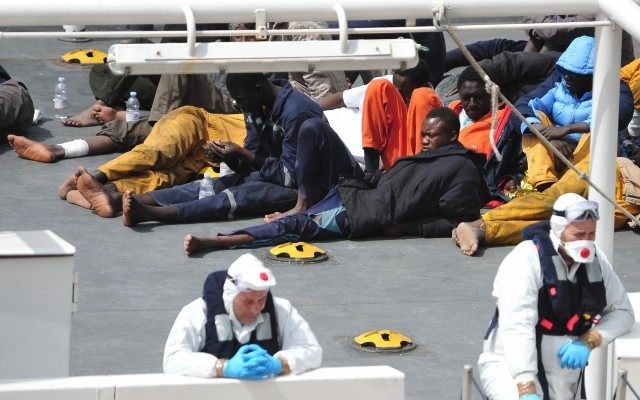Katie Hopkins has been widely castigated for penning a column declaring that she does not care about hundreds of north African migrants drowning in the Mediterranean, calling them “cockroaches” and calling for “gunships” to be sent in to deal with the “problem”.
The backlash was inevitable: you simply can’t THINK things like that. And you certainly can’t SAY them. But while her choice of words leaves an awful lot to be desired, the truth is that Katie Hopkins’ opinion of desperate migrants is not just one sadly shared by many millions of other Britons, it is one that appears to be shared by our own government as well.
You might not hear David Cameron calling north African migrants “cockroaches” or “feral” but, while it’s easy to condemn Hopkins’ sentiment, she is far from being alone in believing that the fate of millions of north Africans is simply Not Our Problem.
Because the reason so many hundreds of north Africans are dying in the Mediterranean this year, as they seek a better life in Europe, isn’t the fault of Ms Hopkins and her ilk.
It’s the fault of our government and all the other EU member states who callously agreed last October to end the EU-funded search and rescue service in the Mediterranean which had previously saved so many innocent lives.
Shame on Katie Hopkins but, more importantly, shame on our government and the EU for ignoring the plight of these people in their hour of need.
These people are not “cockroaches”. They are just ordinary men, women and children, like you or me, who want a better life.
The argument at the time was that the prospect of being rescued from their unseaworthy boats – provided for a hefty fee by people traffickers – was simply acting as an incentive to encourage more migrants to attempt the journey. That went well, then.
Desperate people will do desperate things. If you treat people – any people, you and me included – like animals, they will behave like the animals Hopkins believes they are. But there is nothing base about the desire for a better life, or indeed any life at all.
Imagine the level of fear and desperation that any parent must feel to put themselves and their young children – as many have done over the past few days alone – on a rickety, over-loaded boat to travel hundreds of miles to a foreign land with nothing but the possessions they can carry on their backs?
If you had no hope of a decent life in your home country, where chaos, violence and disorder reign, why wouldn’t you leave in the hope of finding something better, regardless of whether you thought the EU might send the coastguard out to rescue you if the boat capsizes?
The trouble is, the hundreds of men, women and children who have perished in the past week are not the end of the story, indeed far from it. They are merely the opening chapter of what may be a century-long story to come of mass migration from the world’s poorest nations to the richest.
Those migrants number not in their hundreds or thousands, but in their millions. There are, after all, quite a few billion people living on this planet who can only dream one day of living in the promised land of milk and honey that we call Western Europe.
And make no mistake, the worst life available in Italy, France or Britain is far beyond the wildest dreams of many north Africans fleeing their homelands.
So what are we going to do about it? Open up, as Katie Hopkins suggests, a P&O ferry service between Libya and the European coastline? Clearly not. But ignoring the problem and hoping it will go away (which is a fairly accurate summary of our current government’s policy) hasn’t worked either.
You don’t have to be a xenophobe or Little Englander to believe that Britain can’t take all of the desperate north Africans who might end up at Calais trying to board lorries and ferries to make their way here. But, realistically, how many of these people do the Hopkins-haters propose that we – and Italy, and France, and Spain – take in? A hundred, a thousand, a million? Any takers?
That’s the real question, because I have no doubt that in the weeks to come we will hear the heart-rending personal stories of individual migrants who make it to our shores and many people will sign petitions calling for them to be allowed to stay here. But making ourselves feel all warm and fuzzy about one deserving family doesn’t solve the fundamental problem of what to do about the many more in exactly the same dire straits who will soon follow.
As much as we may stick our heads in the sand, this problem is not going to go away; it’s going to get worse. And it is to a certain extent of our own making, through our own foreign policy failures in the Middles East and North Africa. Tyrannical despots may not be very nice, but they tend to do a very good job of keeping their own populations under control. When you help to oust them from power, that control goes too.
You, like me and many others, may not like what Katie Hopkins says or the way she says it but when it comes to the deaths at sea of hundreds of people from a foreign country, for all the talk of hand-wringing that we’re now hearing from ministers and officials, “Not Our Problem” is actually official Government policy.

COMMENTS
Please let us know if you're having issues with commenting.